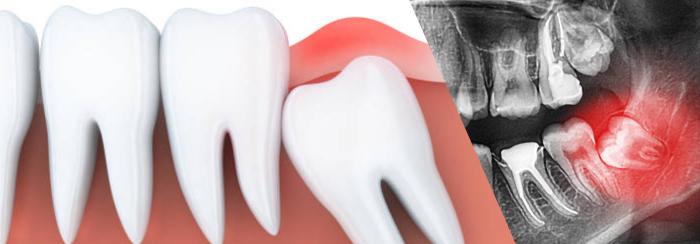What to Expect with Wisdom Tooth Extraction Surgery
Is it time for your third molars to come out?

Wisdom teeth are essentially a third set of molars that typically erupt between the ages of 17 and 25, coming in at the very back of the mouth.
In many cases, a dentist will suggest removal of these wisdom teeth, particularly if the teeth are “impacted” with no room to fully erupt, as they are likely to cause certain problems such as:
Pain: Wisdom tooth can cause a lot of pain and discomfort when there is not adequate space for them to completely come in.
Overcrowding: When wisdom teeth come in at the wrong angle, they can push on and put pressure on other healthy teeth. Because there is no room for them in the mouth, this leads to the overcrowding of existing teeth.
Tooth decay and/or gum disease: Impacted wisdom teeth can lead to problems like cavities and gum disease due to their being harder to reach and clean.
What to expect during surgery
A typical wisdom tooth surgery should take around 45 minutes or less. You will receive a local anesthetic to protect you from pain during the procedure, and additionally, may also receive nitrous oxide (laughing gas) for a more relaxing experience.
Alternatively, IV sedation or general anesthesia may be recommended for your procedure, especially if you are undergoing a more complex wisdom tooth removal surgery.
When the wisdom teeth are considerably impacted or buried in the gum, the surgery will be considered as complex. In these cases, it is necessary to cut the gum in order to access and remove the tooth. The gum will then be stitched shut for quick healing.
How to ensure a quick and successful recovery following surgery
It’s common to experience some swelling and mild discomfort for up to 3 or so days following your wisdom tooth removal, and the mouth will generally be completely healed after a few weeks.
For the best recovery outcome possible, it’s important to follow the instructions that your dentist or surgeon provided. This will typically include a list of dos and don’ts to adhere to:
Following surgery, do:
- Follow your dental care practitioner’s instruction.
- Apply ice to the face to reduce swelling.
- Gently open and close the mouth to exercise the jaw.
- Only eat soft foods such as jello, soup and mashed potatoes.
- Drink plenty of sugar-free fluids.
- Brush your teeth beginning the second day following surgery, not the day of following surgery.
- Take the medication your doctor prescribed to reduce swelling and pain.
- Contact your doctor if you experience a fever, or if your pain or swelling does not improve.
Following surgery, don’t:
- Drink through a straw, as the sucking motion may loosen blood clots that play a role in healing.
- Brush your teeth against any blood clots.
- Rinse your mouth using too much force. In fact, it’s generally recommended you rinse very gently using saltwater.
- Consume any hard, crunchy or sticky foods that may irritate your wounds and hinder healing.
- Smoke, as smoking can also slow your recovery.
For wisdom tooth removal at a Teeth First Dental Network clinic near you…
Select Teeth First Dental Network clinics in Ontario provide expert wisdom tooth removal service, including the following locations:
- Ajax Dental Centre
- Smiley Dental in Bolton
- Monarch Dentistry in Burlington
- Kennedy North Dentistry in Caledon
- Cambridge Dental Care
- Grand River Dental Centre in Fergus
- Dentistry on the Mountain in Hamilton
- Monarch Dentistry in Kitchener
- Monarch Dentistry in Toronto
- Leamington Sedation Dentistry
- Apple Tree Dental and Longo Dentistry in London
- Pearl Dental Care in Mississauga
- Markham Dental
- Monarch Dentistry in North York
- Family Dentist Tree in Oakville
- Groot Dental in Oshawa
- Carling Dental in Ottawa
- 600 Tecumseh Dental in Windsor